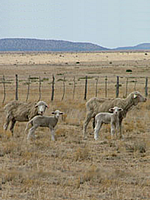
Watson, Donald W. and Watson, Farrell L.AboutUse of Italian and German prisoners of war on parents' farm and in their dairy during World War II. Additionally they discussed the move from horse-drawn farm equipment and extensive hand labor to mechanized farming.
Abstract
Tape 1, Side A
Farrell Watson discusses prisoners of war (POWs) he remembers working on his parents' farm and dairy [300 Holstein cows]. He stated the Italians would not work, would sit down and sing. German POWs replaced the Italian POWs at Orchard Park and they were good workers. His dad gave the German POWs milk to drink, cold milk for their lunches, which they enjoyed. Farrell remembers talking to the guards; to his knowledge there were no escape attempts. His dad also gave the prisoners tomatoes. Don Watson remembers his parents, Albert and Clara Watson, talking when the interment camp at Orchard Park was being built. They felt secure that the Army would guard the camp well. His dad was eager to get help on the farm. They had crops to harvest and weeds to be cut. Labor was scarce. There was cotton to pick and there were eight or nine gins in the area. All work was done by hand. Don would ride in the pick-up between his father or grandfather and the guard when they would go pick up small groups of prisoners. Most of the Germans were healthy and enjoyed working. It was the time of transition between horse-drawn equipment and tractors. The prisoners built a new horse barn, shed, tack room and granary for his dad. When it was finished there was a "freakish accident" and it all burned down. The cause of the fire was not proven; however, they suspected five individuals considered to be "pretty hard." These five POWs were sent to a camp in California. One of the guards was Dick Drysdale from the East Grand Plains area out of Roswell. Another guard taught Don to shift gears. One of the POWs had a daughter about the same age as his sister, Barbara Jean Watson, and he was friendly to her. He was a good person and she remembers him fondly. Another POW, Fritz Crown, was remembered. His parents owned a flour mill in Germany. The consultants' father took Fritz to town with him to pick up supplies once and camp administrators never let Crown come back to the farm after they learned of the trip. The German POWs complained about some of the food they were given to eat. They enjoyed the tomatoes and melons. They brought a box lunch at noon, but they were not like the hearty meals they were used to in Germany. They enjoyed the milk, and they missed home. Farrell, Don and Marcie spoke of being neighbors in the '50s. Farrell was working on and off at the farm until 1980. He attended one year of college at New Mexico State University and completed school at Eastern New Mexico University and earned a degree in accounting. Don attended NMSU for two and a half years and worked the farm until 1978. The Watsons discussed the transition on the farm from horse-drawn equipment to tractors. They described other equipment they used, such as a forge and an acetylene welder. Their first tractors were a little Allis-Chalmers, an old WD45-A.C. and a John Deere. They spoke of some of the floods in Roswell. |

